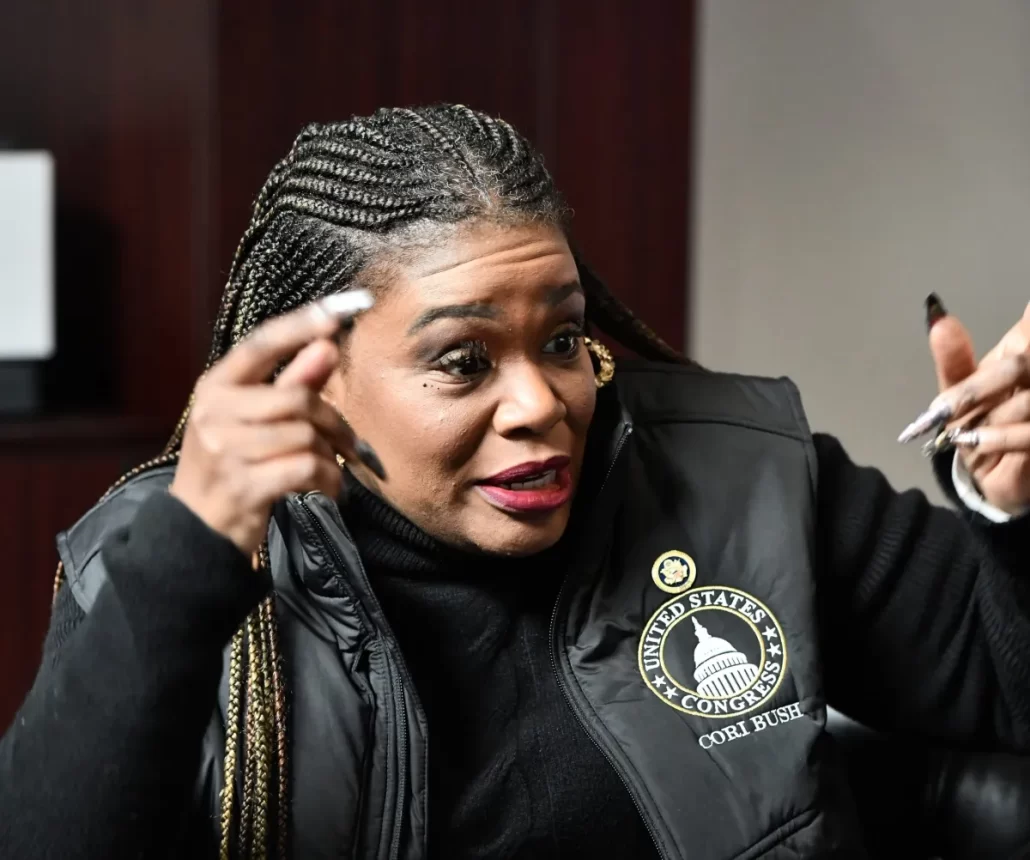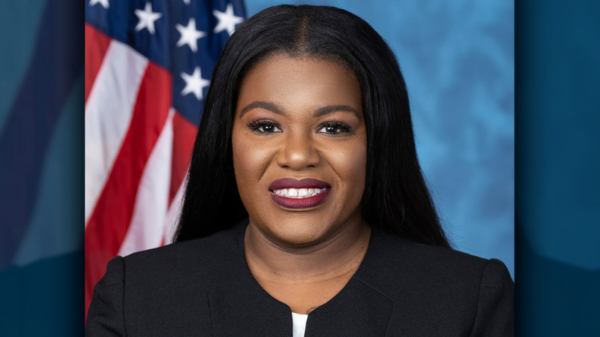Friday was Cori Bush’s last day as U.S. Congressional Representative for the 1st district of Missouri.
By Blake Strode
The St. Louis American
https://www.stlamerican.com/

In August of 2020, Cori Bush shocked the political world by defeating a ten-time incumbent and became the first Black woman to represent Missouri in the United States Congress. She leaves four years later, losing her seat after an intense and bruising campaign. It’s possible to recap Bush’s political trajectory in those two sentences and be done with it. But I think that would be a mistake.
We should not close out this chapter without marking the end of Bush’s four truly remarkable years of public service to St. Louis. Bush modeled a level of courage, clarity, and principled consistency that is both incredibly rare and urgently needed.
In the People’s Response Act (PRA), Bush offered a framework to invest billions of federal dollars in holistic and health-centered approaches to community safety. Building on abolitionist organizing in St. Louis and across the country, Bush’s PRA promoted a vision of safety without reliance on police and prisons.
I feel some awkwardness in writing these words. I subscribe to a tradition that regards electoral politics as a tool—a dangerous one, at that—and elected officials primarily as obstacles to be navigated. This understanding is well-rooted in the history of social movements, generally, and of the Black freedom struggle, specifically. Among those who identify with such a tradition, it’s risky, if not embarrassing, to be seen heaping praise on a high-profile public official. I would be lying if I said I have no worries that some will view my words through this lens.
Still, I worry more that we take the wrong lesson from Bush’s ascent and defeat. I’ve lost count of the professional post-election takes that amount to an obituary for the left-wing progressive politics Bush championed. They say she was “too far left” for her district. They say she ignored her legislative responsibilities in favor of headline-grabbing antics. They say candidates like her could get elected during the extraordinary circumstances of 2020 but don’t represent the priorities of real people in St. Louis.

In our hyper-competitive capitalist society, we tend to measure success in terms of scale. For a politician, that means the longer you stay in office the more successful you are. But the truth is Cori Bush had more impact in four years as a relatively junior congresswoman than many have in four decades. She did so by reshaping the terms of debate on multiple fronts.
They are wrong.
Bush led a sleep-in on the U.S. Capitol steps to protest the end of the pandemic-era eviction moratorium. The House of Representatives had gone into recess without acting and the President insisted that he could do nothing. Bush, drawing on personal experience with homelessness, said she would keep fighting to prevent people from losing their homes. Some dismissed her actions as a stunt. But, after Bush camped outside for nearly four days, the President announced that his administration would extend the moratorium for another two months. (It lasted slightly less than that before the Supreme Court struck it down.) We may never know exactly how many people were spared from eviction and homelessness as a result.
Later that year, to raise awareness about the assault on reproductive rights, Bush shared publicly that she was raped at 17 and chose to have an abortion. She also spoke honestly about how she was disrespected by some of the doctors and nurses because she was a young Black girl, despite knowing that abortion opponents would try to weaponize this experience. She insisted that Black women deserved nothing less than the truth. “To all the Black women and girls who have had abortions and will have abortions, we have nothing to be ashamed of,” she said. “We live in a society that has failed to legislate love and justice for us, so we deserve better, we demand better, we are worthy of better.”
Bush championed environmental justice legislation to target low-income communities and communities of color that are often ignored despite being most impacted by issues like air and water pollution. She worked with local advocates on the legislation, which ultimately created the Environmental and Climate Justice Program as part of the Inflation Reduction Act.
But these were not the most controversial of Bush’s positions.
Bush famously withheld her support from a bipartisan infrastructure bill passed in 2021. While in favor of the physical infrastructure investments in the bill—roads, bridges, tunnels, and construction jobs—Bush maintained that her constituents desperately needed the human infrastructure that had been stripped out: universal pre-K, housing, paid family leave, and an annual child tax credit. This stance later became a major opposition talking point. But it’s easy to see the wisdom of her position given the economic frustrations that came to define the 2024 general election.
Bush introduced two pieces of legislation in support of grassroots demands for public safety and racial justice. In the People’s Response Act (PRA), Bush offered a framework to invest billions of federal dollars in holistic and health-centered approaches to community safety. Building on abolitionist organizing in St. Louis and across the country, Bush’s PRA promoted a vision of safety without reliance on police and prisons. She also introduced the Reparations Now Resolution, elevating the demand for federal reparations for the enslavement and systemic oppression of Black Americans. In both cases, Bush refused to back away from the radical racial justice movements that inspired her to enter politics.
This steadfastness was on display again when Bush became one of the earliest and loudest supporters of a ceasefire and humanitarian aid in Gaza. Her defiance of the longstanding bipartisan consensus on Israel and Palestine is what led to the primary challenge that lost Bush her seat. When she introduced the Ceasefire Now Resolution, approximately 1,200 Israelis and 2,700 Palestinians had been killed. Today, more than 45,000 Palestinians have been killed according to the United Nations, more than 14,500 of them children. That we failed to heed the early warnings by Bush and others is a moral stain that will remain with us for generations.
Bush’s electoral loss is not a rejection of the values she promoted—note that it required the second-highest spending in the history of congressional primaries to unseat her (bested only by a district that includes the New York City media market). Instead, it is a reminder that those values are a threat to the status quo. There are many people of privilege in this town who have mastered the rhetoric of “empowering underrepresented communities.” But Bush has been the embodiment of a public servant unapologetically committed to the interests of those very communities at all costs. And those same people of privilege may be the only ones surprised to learn that they, in fact, don’t much care for such a thing.
I have no expectations of those who are truly oppositional to the causes Bush has stood for. But I know there are more of us who stand for those same causes, who believe that transformation is possible and justice can be a real organizing principle in our lives, not just empty words on a page. It is very often the lack of such vision that leaves people feeling disillusioned and disinterested. We can have housing, health, peace, safety, and equity, all at once. We deserve this and more, and we must keep fighting for it.
I believe that those who run for office sign up for the slings and arrows alongside the glory. Politics, as they say, ain’t beanbag. Bush has not asked for sympathy or apology for her electoral fates, and I will offer neither. But I will say thank you, Cori Bush, for a job well done.
Blake Strode is a civil rights lawyer and advocate in St. Louis, Missouri.





You must be logged in to post a comment Login